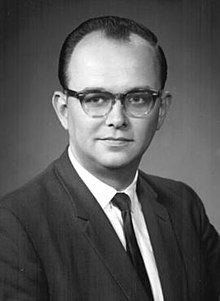
Back هيو إيفرت الثالث Arabic هيو ايفرت التالت ARZ هیو اورت AZB Hugh Everett III Catalan Hugh Everett III Danish Hugh Everett German Hugh Everett Spanish هیو اورت Persian Hugh Everett Finnish Hugh Everett French
Hugh Everett III | |
|---|---|
 Hugh Everett in 1964 | |
| Born | November 11, 1930 |
| Died | July 19, 1982 (aged 51) |
| Citizenship | United States |
| Alma mater | Catholic University of America Princeton University (PhD) |
| Known for | Many-worlds interpretation Everett's theorem[1][2][3] |
| Children | Elizabeth Everett, Mark Oliver Everett |
| Scientific career | |
| Fields | Physics Operations research Optimization Game theory |
| Institutions | Institute for Defense Analyses American Management Systems Monowave Corporation |
| Doctoral advisor | John Archibald Wheeler |
Hugh Everett III (/ˈɛvərɪt/; November 11, 1930 – July 19, 1982) was an American physicist who, in his 1957 PhD thesis, proposed what is now known as the many-worlds interpretation (MWI) of quantum mechanics.
In danger of losing his draft deferment, Everett took a research job with the Pentagon the year before completing the oral exam for his PhD and did not continue research in theoretical physics after his graduation.[4] Afterward, he developed the use of generalized Lagrange multipliers for operations research and applied this commercially as a defense analyst and a consultant. He died at the age of 51 in 1982. He is the father of musician Mark Oliver Everett.
Although largely disregarded until near the end of Everett's lifetime, the MWI received more credibility with the discovery of quantum decoherence in the 1970s and has received increased attention in recent decades, becoming one of the mainstream interpretations of quantum mechanics alongside Copenhagen, pilot wave theories, and consistent histories.
- ^ Lemaréchal (2001, pp. 125–126): Lemaréchal, Claude (2001). "Lagrangian relaxation". In Michael Jünger and Denis Naddef (ed.). Computational combinatorial optimization: Papers from the Spring School held in Schloß Dagstuhl, May 15–19, 2000. Lecture Notes in Computer Science. Vol. 2241. Berlin: Springer-Verlag. pp. 112–156. doi:10.1007/3-540-45586-8_4. ISBN 978-3-540-42877-0. MR 1900016. S2CID 9048698.
- ^ Everett (1963)
- ^ Everett (1957b)
- ^ "The Many Worlds of Hugh Everett" by Peter Byrne, from Scientific American, December 2007
© MMXXIII Rich X Search. We shall prevail. All rights reserved. Rich X Search